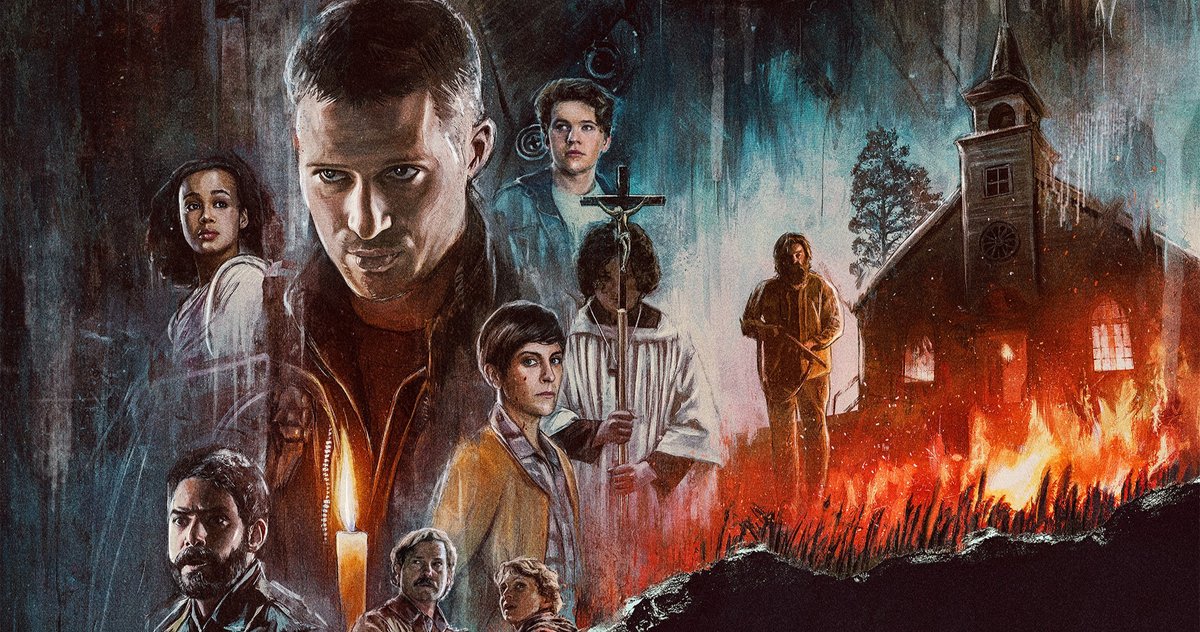
As we’ve come to expect from Mike Flanagan’s work, Midnight Mass (2021) tells a poignant, complex, profoundly human story that unites character-driven drama and supernatural horror.
Riley Flynn (Zach Gilford) returns to his hometown on an isolated island after serving his prison sentence for killing a young woman while driving drunk. He finds that the town’s economy, fueled primarily by fishing, has been badly affected by an oil spill. When his parents drag him to church, they find their former rector, Msgr. Pruitt, replaced by a young priest whom no one recognizes named Father Paul (Hamish Linklater). The series follows what seems at first to be a religious revival fueled by Father Paul’s miracles; the much darker reality of the situation slowly unfolds over seven episodes. 
In many ways, it feels like a Stephen King story. The small town setting, religious fanaticism, and supernatural themes could have easily taken place in Castle Rock. King’s influence makes sense, given Flanagan’s recent adaptions, Doctor Sleep (2019) and Gerald’s Game (2017). Even when not adapting King directly, Flanagan takes inspiration from him. For example, Oculus (2013) may have drawn more than a little from “1408,” a King short story collected in Everything’s Eventual. More recently, Flanagan announced that he was working on an adaption of Stephen King’s Revival, a horror story involving religious fanaticism, a charismatic priest, and a small seaside town. Sound familiar? Though Flanagan wrote a King-approved script, the project didn’t move into production. In some ways, Midnight Mass feels like an homage to Revival and its abandoned adaption.
Midnight Mass shines brightest while it explores backstory. The connection felt with the characters in a mere seven episodes is extraordinary. These backstories occasionally tend toward climactic moments, like the incredibly moving scene in which Leeza Scarborough (Annarah Cymone) forgives Joe Collie (Robert Longstreet), the man who put a bullet in her spine in a drunken accident, leaving her in a wheelchair. Cymone’s monologue here is a standout moment.
Flanagan demonstrates a familiarity with religion. In a less thoughtful writer or director’s hands, the parallels between the eucharist and vampirism could have been silly, crass, or ham-fisted, and the portrayals of manipulation and the gullibility of the religious characters could have come across as smug cheap shots, but Midnight Mass avoids these pitfalls by attending to religious complexity. It tarries with the homilies, the vestments, the altar guild, studying the rhythms of religious life. It examines how religion provides the scaffolding for the emotional lives of its characters. The show provides a rich context, and in that context, the eucharist and the blood of the “angel” both stand in as a visible, ingestible symbol of the hopes and desperations of the gathered community. This is all to say that the shocking religious horror that looms over the last few episodes of this series was fully earned.

A character-centric series, Midnight Mass features some excellent performances. Kate Siegel, Rahul Kohli, Hamish Linklater and Zach Gilford all shine in this series, along with the rest of the cast. For me, though, the standout performance came from Samantha Sloyan as Bev Keane, a zealous and tyrannical antagonist. Sloyan is able to oscillate between the authentic and the cynical with remarkable ease, portraying a villain who ever so slightly tilts her hand in the awkward pauses between words and sudden shifts in tone.
And yet, Midnight Mass suffers a bit from overwritten dialogue (or, in one case, monologue) and scenes that occasionally linger to the point of boredom. These flaws were especially present in its final episode. One of Flanagan’s greatest strengths, his unhurried willingness to attend to detail, can occasionally impede the plot.

Despite any flaws, though, Midnight Mass may be Flanagan’s best project yet. It marries the poignant, deeply personal horror of The Haunting Of Hill House (2018) with the speculative imagination of Oculus or Doctor Sleep. Even as Flanagan nods to his previous work in Midnight Mass, the series also pushes forward to new ground for the filmmaker. Rather than adapting previous literature or creating a more episodic horror franchise, Flanagan seems to have produced, for the first time, the beginnings of an original, deeply textured world. Who knows? Perhaps Crockett Island could turn out to be Flanagan’s Castle Rock. Sign me up for any subsequent films or series in the Flanagan Cinematic Universe.




